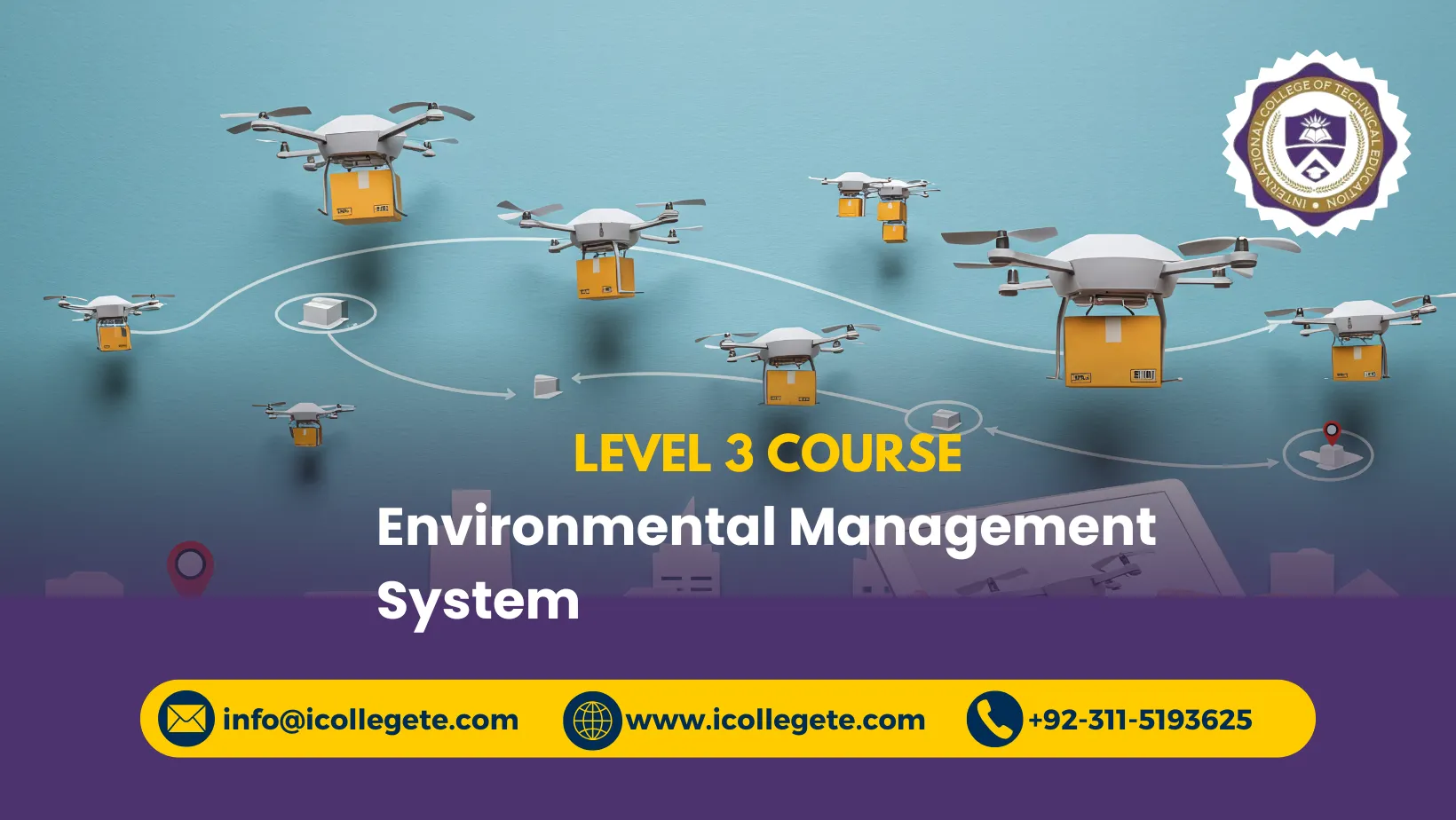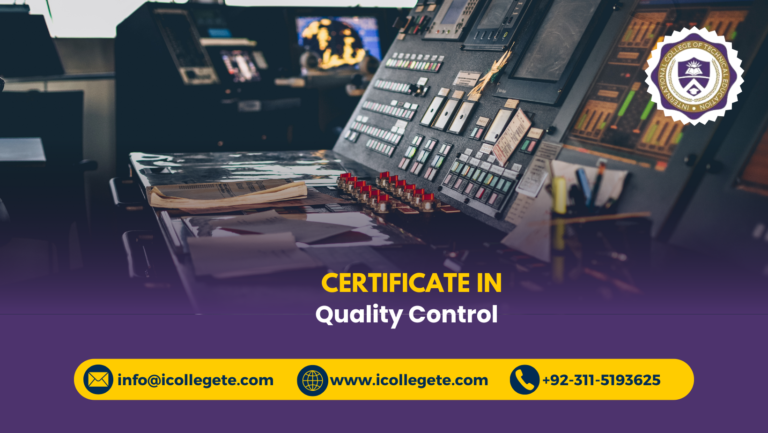Start your journey into the world of environmental responsibility with the Environmental Management System (EMS) Level 3 Course in Rawalpindi—a foundational program designed to introduce learners to the core principles of environmental management. Environmental Management System level 3 Course in Rawalpindi is ideal for individuals seeking to understand how organizations manage their environmental impact and comply with basic environmental regulations.
The Environmental Management System level 3 Course in Rawalpindi provides a clear and accessible introduction to environmental systems, focusing on key topics such as pollution control, waste management, energy conservation, and environmental awareness. Learners will explore the purpose and benefits of implementing an EMS, including how Environmental Management System level 3 Course in Rawalpindi supports sustainability, legal compliance, and operational efficiency. The Environmental Management System level 3 Course in Rawalpindi also introduces the basic structure of ISO 14001, helping participants understand how international standards guide environmental practices.
Designed for beginners, Environmental Management System level 3 Course in Rawalpindi requires no prior experience or technical background, making Environmental Management System level 3 Course in Rawalpindi suitable for students, entry-level employees, or anyone interested in environmental protection. Through interactive sessions and practical examples, learners will gain the confidence to support environmental initiatives in their workplace or community.
By completing the Environmental Management System Level 3 Course in Rawalpindi, participants will be equipped with the foundational knowledge needed to pursue further training or contribute to basic environmental practices in various sectors.
Course Overview
The Environmental Management System (EMS) Level 3 Course in Rawalpindi is a beginner-level qualification designed to introduce learners to structured environmental practices through six focused study units. Environmental Management System level 3 Course in Rawalpindi offers a simplified yet practical overview of how organizations can manage their environmental responsibilities using basic system-based approaches. Each unit is carefully crafted to build awareness and understanding of key environmental topics such as pollution prevention, resource conservation, workplace sustainability, and basic compliance procedures.
Rather than focusing on technical depth, the course emphasizes clarity, accessibility, and relevance for those new to the field. Environmental Management System level 3 Course in Rawalpindi is particularly suitable for students, entry-level employees, and individuals working in support roles who want to understand how environmental systems operate in everyday settings. The six-unit structure ensures that learners progress gradually, gaining confidence as they explore each topic through relatable examples and guided instruction. Participants will also be introduced to basic documentation practices and simple monitoring techniques that support environmental goals.
Delivered in Rawalpindi, Environmental Management System level 3 Course in Rawalpindi is ideal for local learners seeking a foundational understanding of EMS principles without the complexity of advanced standards. Environmental Management System level 3 Course in Rawalpindi serves as a stepping stone to higher-level EMS qualifications and prepares learners to participate in environmental initiatives at the community or organizational level. With its practical orientation and beginner-friendly format, the EMS Level 3 Course empowers individuals to take their first steps toward environmental awareness and workplace sustainability.
Course Study Units
- Introduction to Environmental Management Systems
- Basic Environmental Legislation and Compliance
- Pollution Control and Waste Management Fundamentals
- Energy Conservation and Resource Efficiency
- Environmental Awareness and Workplace Practices
Learning Outcomes for this course
Develop Basic Understanding of Environmental Management
- Explain the purpose and importance of environmental management in workplace settings
- Identify common environmental challenges faced by industries and communities
- Understand how structured systems help reduce environmental impact
- Recognize the role of individuals in promoting sustainability
- Describe basic environmental terms and concepts clearly
- Understand the link between environmental practices and organizational responsibility
- Appreciate the benefits of adopting environmental management systems
Recognize Key Environmental Issues and Risks
- Identify sources of pollution and waste in everyday operations
- Understand the impact of poor environmental practices on health and ecosystems
- Recognize common environmental hazards in industrial and public settings
- Learn basic methods for reducing environmental risks
- Understand the importance of early detection and prevention
- Support safe and responsible workplace behavior
- Promote awareness of environmental risks among peers
Understand Basic Environmental Legislation
- Learn about local and national environmental laws relevant to entry-level roles
- Recognize the importance of legal compliance in environmental management
- Understand the consequences of non-compliance for individuals and organizations
- Identify simple procedures that support legal obligations
- Support documentation and reporting for basic compliance needs
- Promote ethical practices aligned with environmental regulations
- Encourage responsible behavior in line with legal standards
Apply Simple Pollution Control and Waste Management Practices
- Understand basic principles of pollution prevention and control
- Identify types of waste and their environmental impact
- Learn simple methods for waste reduction and segregation
- Support recycling and reuse initiatives in the workplace
- Promote clean and safe handling of materials
- Assist in maintaining a tidy and environmentally friendly workspace
- Encourage others to follow waste management guidelines
Promote Energy Conservation and Resource Efficiency
- Recognize the importance of conserving energy and natural resources
- Identify common sources of energy waste in daily operations
- Learn basic techniques for improving resource efficiency
- Support initiatives that reduce water, electricity, and material usage
- Encourage responsible use of equipment and supplies
- Monitor simple indicators of resource consumption
- Promote eco-friendly habits among colleagues
Support Environmental Awareness and Workplace Engagement
- Participate in environmental awareness activities and campaigns
- Share knowledge about sustainability with peers and teams
- Encourage involvement in community-based environmental efforts
- Help organize basic training sessions or awareness events
- Communicate environmental messages clearly and effectively
- Promote teamwork in achieving environmental goals
- Foster a culture of responsibility and care for the environment
Understand Basic EMS Documentation and Monitoring
- Learn the purpose of environmental records and reports
- Identify simple documentation formats used in EMS
- Support the collection of basic environmental data
- Assist in maintaining logs for waste, energy, and compliance
- Understand the role of monitoring in continuous improvement
- Promote accurate and timely record-keeping
- Contribute to transparency in environmental practices
Entry Requirements for this course
- Minimum Age Requirement Applicants must be at least 16 years old. This ensures they have the maturity and basic understanding needed to engage with environmental concepts and workplace practices.
- Educational Qualification Candidates should have completed at least Matriculation (Grade 10) or an equivalent qualification. A general understanding of science or social studies is helpful but not mandatory.
- Work Experience (Optional) No prior work experience is required for this course. However, individuals with basic exposure to workplace environments or community projects may find it easier to relate to the course content.
- Language Proficiency Learners must be able to read and understand basic English, as course materials and instructions are primarily delivered in English. This helps ensure smooth participation and comprehension.
- Basic Literacy and Numeracy Skills Applicants should be comfortable with reading, writing, and performing simple calculations. These skills are essential for understanding environmental data and completing course activities.
- Interest in Environmental Topics Candidates should have a genuine interest in environmental protection, sustainability, or workplace safety. Motivation to learn and apply EMS principles is key to success in this course.
- Availability for Study and Participation Learners must be able to commit time for attending sessions, completing assignments, and participating in group activities. Regular engagement is necessary to meet learning outcomes.
- Access to Basic Learning Tools It is recommended that learners have access to a notebook, pen, and a mobile device or computer. These tools support note-taking, research, and interaction with course materials.
Course Benefits of this course
Build Foundational Environmental Knowledge
- Understand basic environmental concepts and terminology
- Learn the purpose and structure of environmental management systems
- Recognize the importance of sustainability in everyday operations
- Gain awareness of pollution sources and control measures
- Identify simple environmental risks in workplace settings
- Understand the role of individuals in environmental protection
- Develop a mindset of responsibility and care for the environment
- Learn how structured systems support environmental goals
- Prepare for further learning in environmental management
Improve Workplace Environmental Practices
- Promote clean and safe work environments
- Support basic waste segregation and recycling efforts
- Encourage responsible use of energy and materials
- Help reduce pollution through simple daily actions
- Assist in maintaining environmental records and logs
- Contribute to team-based sustainability initiatives
- Share environmental knowledge with colleagues
- Support compliance with basic environmental guidelines
- Foster a culture of environmental awareness
Enhance Career Readiness for Entry-Level Roles
- Qualify for support roles in environmental departments
- Strengthen your resume with a recognized Level 3 certification
- Gain practical skills valued by employers in technical sectors
- Prepare for roles in manufacturing, construction, and public services
- Build confidence for future training and specialization
- Improve employability in local and regional job markets
- Explore opportunities in community-based environmental projects
- Develop transferable skills in documentation and teamwork
- Lay the groundwork for career progression in sustainability
Support Community and Environmental Engagement
- Participate in local environmental awareness campaigns
- Encourage eco-friendly habits in schools and neighborhoods
- Share knowledge with family and community members
- Help organize basic environmental events and clean-up drives
- Promote responsible behavior in public spaces
- Support local NGOs and environmental initiatives
- Raise awareness about pollution and resource conservation
- Contribute to community-based sustainability efforts
- Inspire others to take part in environmental protection
Strengthen Communication and Teamwork Skills
- Learn to communicate environmental messages clearly
- Support group discussions on sustainability topics
- Assist in preparing basic reports and presentations
- Promote collaboration in environmental activities
- Build confidence in sharing ideas and feedback
- Encourage team participation in eco-friendly practices
- Develop leadership potential through group projects
- Improve interpersonal skills in workplace settings
- Foster positive relationships through shared goals
Increase Awareness of Legal and Ethical Responsibilities
- Understand the basics of environmental laws and regulations
- Recognize the importance of legal compliance in daily operations
- Promote ethical behavior aligned with environmental standards
- Support documentation for basic compliance needs
- Encourage responsible decision-making in the workplace
- Learn how regulations protect health and ecosystems
- Help others understand their environmental responsibilities
- Contribute to a safer and more compliant work environment
- Build awareness of rights and duties under environmental law
Prepare for Further Environmental Training
- Build a strong foundation for Level 4 and Level 6 EMS courses
- Understand key concepts needed for advanced certifications
- Gain confidence to pursue internal auditing or reporting roles
- Learn how to apply basic EMS principles in real-world settings
- Identify areas of interest for future specialization
- Strengthen readiness for ISO 14001-based training
- Explore pathways into environmental compliance and safety
- Develop motivation for continuous learning in sustainability
- Position yourself for long-term growth in environmental fields
Promote Personal Growth and Responsibility
- Cultivate habits of environmental mindfulness
- Develop a proactive attitude toward sustainability
- Align personal values with global environmental goals
- Improve decision-making through awareness of impact
- Build self-confidence through skill development
- Encourage lifelong learning and improvement
- Take pride in contributing to a cleaner environment
- Inspire others through personal example
- Become a responsible citizen in environmental matters
Who Should Enroll in this course
- Students with Matric or Intermediate Education Ideal for those who have completed basic schooling and want to explore environmental studies before choosing a career path.
- Entry-Level Job Seekers in Technical Fields Individuals aiming to work in manufacturing, construction, or public services who need foundational environmental knowledge.
- Support Staff in Industrial or Commercial Settings Workers assisting in operations, maintenance, or logistics who want to understand basic environmental responsibilities.
- Community Volunteers and NGO Workers People involved in local sustainability or awareness campaigns who need structured knowledge to support their efforts.
- School and College Teachers (Non-specialist) Educators who wish to integrate environmental awareness into general teaching without needing advanced technical expertise.
- Administrative Personnel in Safety or Compliance Departments Office staff managing records or assisting in environmental documentation who benefit from understanding EMS basics.
- Interns and Trainees in Environmental Roles New entrants in environmental departments who require formal training to support their practical experience.
- CSR and Sustainability Program Assistants Individuals supporting corporate responsibility initiatives who want to align their work with structured environmental systems.
- Warehouse and Facility Maintenance Workers Staff handling materials, waste, or equipment who need to follow basic environmental procedures.
- Health and Safety Support Staff Those assisting in HSE roles who want to expand their understanding to include environmental practices.
- Small Business Owners in Industrial Sectors Entrepreneurs managing workshops or facilities who want to implement basic environmental controls.
- Vocational and Technical Diploma Students Learners pursuing trade qualifications who want to add environmental awareness to their skill set.
- Freelancers Offering Basic Compliance Services Independent workers providing documentation or training support who need EMS knowledge to enhance credibility.
- Public Sector Field Workers Government employees involved in inspections or monitoring who require foundational EMS training.
- Environmental Enthusiasts and Advocates Individuals passionate about sustainability who want to formalize their understanding and contribute more effectively.
- Job Seekers Preparing for ISO 14001 Workplaces Candidates aiming to work in ISO-compliant environments who need introductory EMS knowledge.
- Training Coordinators and Workshop Facilitators Professionals who deliver awareness sessions and want structured content to support their programs.
- Retail and Hospitality Staff Employees in customer-facing roles who want to support eco-friendly practices in daily operations.
- Individuals Seeking Career Change into Environmental Fields Those transitioning from unrelated sectors who want to build a foundation in environmental management.
- Anyone Interested in Environmental Responsibility Learners of all backgrounds who want to contribute to sustainability and understand how structured systems support change.
Future Progression of this course
Progression to EMS Level 4 or Level 6 Courses
- Advance to higher-level EMS qualifications for deeper system understanding
- Learn structured approaches to environmental auditing and documentation
- Explore ISO 14001 implementation techniques and compliance frameworks
- Build technical skills for operational control and performance evaluation
- Prepare for supervisory roles in environmental departments
- Gain access to specialized training in sustainability and compliance
- Strengthen readiness for industry-recognized certifications
Progression to Environmental Awareness and Safety Workshops
- Participate in short courses focused on pollution control and workplace safety
- Learn practical methods for hazard identification and risk reduction
- Support community-based environmental education programs
- Improve knowledge of safe waste handling and disposal practices
- Engage in awareness campaigns promoting eco-friendly behavior
- Build capacity for organizing local sustainability events
- Enhance public speaking and outreach skills
Progression to ISO 14001 Internal Auditor Training
- Learn to conduct internal audits of environmental systems
- Understand audit planning, execution, and reporting procedures
- Identify non-conformities and recommend corrective actions
- Support audit readiness for external certification bodies
- Gain experience in audit documentation and team coordination
- Prepare for roles in compliance monitoring and audit support
- Build foundational skills for future lead auditor development
Progression to Sustainability Reporting and Documentation Roles
- Assist in preparing basic sustainability reports for organizations
- Learn to track and present environmental performance indicators
- Support internal reviews and stakeholder communication
- Contribute to transparency in environmental practices
- Develop skills in formatting and presenting environmental data
- Align reporting efforts with organizational goals
- Prepare for entry-level roles in CSR and ESG functions
Progression to Environmental Risk Assessment Training
- Learn to identify and evaluate environmental risks in operational settings
- Use basic tools to assess impact severity and likelihood
- Support development of mitigation strategies and control measures
- Document risk findings for internal use and compliance
- Collaborate with teams to implement risk reduction plans
- Monitor effectiveness of environmental risk controls
- Prepare for roles in safety and environmental planning
Progression to Waste Management and Resource Efficiency Courses
- Learn techniques for reducing resource consumption and operational waste
- Support implementation of recycling and reuse programs
- Monitor usage patterns and suggest efficiency improvements
- Contribute to cost-saving initiatives through sustainable practices
- Assist in reporting on resource use and environmental impact
- Promote eco-friendly habits within the workplace
- Prepare for roles in sustainability and facility management
Progression to Environmental Communication and Outreach Roles
- Support internal campaigns promoting environmental responsibility
- Assist in preparing educational materials and training content
- Facilitate team discussions on sustainability goals
- Help organize workshops and awareness events
- Communicate EMS procedures clearly to staff and stakeholders
- Promote engagement in environmental initiatives
- Prepare for roles in environmental outreach and education
Progression to Freelance and Entry-Level Consultancy Work
- Offer basic EMS support services to small businesses and NGOs
- Build a portfolio of environmental documentation and compliance projects
- Develop pricing models for freelance environmental services
- Market skills through online platforms and local networks
- Collaborate with organizations on sustainability planning
- Deliver training and awareness sessions independently
- Prepare for growth into full-time consultancy roles
Conclusion
The Environmental Management System Level 3 Course in Rawalpindi offers a practical gateway for individuals seeking to align their personal and professional values with responsible environmental practices. Rather than focusing on technical mastery, Environmental Management System level 3 Course in Rawalpindi encourages learners to observe, question, and engage with the environmental dimensions of everyday work and community life. Environmental Management System level 3 Course in Rawalpindi fosters a mindset of curiosity and accountability, helping participants recognize how small actions contribute to broader sustainability goals.
What makes Environmental Management System level 3 Course in Rawalpindi distinctive is its emphasis on accessibility and relevance. Environmental Management System level 3 Course in Rawalpindi welcomes learners from diverse backgrounds—whether they are entering the workforce, supporting operational teams, or simply interested in making a positive impact. The Environmental Management System level 3 Course in Rawalpindi does not assume prior expertise, making Environmental Management System level 3 Course in Rawalpindi ideal for those who want to build confidence before pursuing more advanced qualifications or roles.
By completing Environmental Management System level 3 Course in Rawalpindi, learners gain more than just a certificate—they develop a foundational lens through which to view environmental challenges and opportunities. Environmental Management System level 3 Course in Rawalpindi can influence how they work, communicate, and contribute to their surroundings. Whether applied in a workplace, community project, or personal initiative, the insights gained from this course can serve as a catalyst for responsible action and lifelong learning in environmental stewardship.
Take the Next Step Toward Environmental Management System level 3 Course in Rawalpindi – Enroll Now






